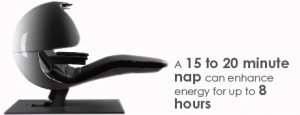How siestas help you remember more

Sleep Pods devised by MetroNap
“It has already been established that those who siesta are less likely to die of heart disease (people who siesta for 20-30 minutes each day are 30% less likely to suffer from heart disease as sleep lowers stress on the heart). Now, Matthew Walker and his colleagues at the University of California, Berkeley, have found that they probably have better memory, too. A post-prandial snooze, Dr Walker has discovered, sets the brain up for learning. The ideal nap, follows a cycle of between 90 and 100 minutes (according the research, napping for 90 minutes after lunch can improve your productivity by up to 10%). The benefits to memory of a nap, says Dr Walker, are so great that they can equal an entire night’s sleep. He warns, however, that napping must not be done too late in the day or it will interfere with night-time sleep. Moreover, not everyone awakens refreshed from a siesta. The grogginess that results from an unrefreshing siesta is termed “sleep inertia”. This happens when the brain is woken from a deep sleep with its cells still firing at a slow rhythm and its temperature and blood flow decreased. Sara Mednick, from the University of California, San Diego, suggests that non-habitual nappers suffer from this more often than those who siesta regularly. It may be that those who have a tendency to wake up groggy are choosing not to siesta in the first place. Perhaps, though, as in so many things, it is practice that makes perfect.” Read the full story in Economist
